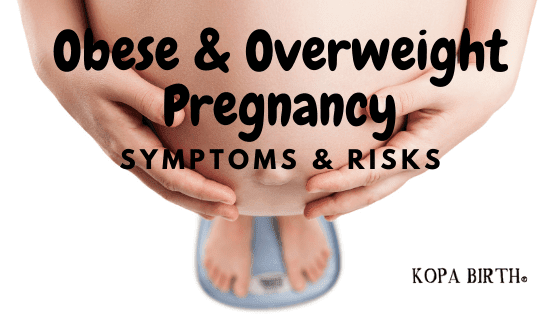
Pregnancy is a time when most women think a lot about their health and the choices they’re making for their bodies. Women who enter pregnancy obese or overweight may carry extra worries about their own body and the health of their babies. Rest assured that women of all sizes deliver perfectly healthy babies!
Estimated reading time: 5 minutes
While mom’s size is not a reason to panic, there are some increased risks for plus-size moms. Let’s explore those risks.
Gestational diabetes (GD) is a form of diabetes that affects a woman only during pregnancy. Women who are overweight are more likely to develop it. GD happens when pregnancy hormones affect the way your body produces or uses insulin, a hormone that turns sugar into energy for your body. The sugar in your blood can rise to levels that are too high, which is called hyperglycemia.
If your sugar remains high because the body can not produce enough insulin, your baby is likely to be larger. This leads to the possibility of a more difficult delivery and increases the risk of cesarean birth. Your doctor or midwife will work on a plan with you, likely starting with a controlled diet and exercise. Your provider may suggest the use of injectable insulin if your sugar can’t be controlled by diet alone. And, you may be encouraged to induce labor a few weeks early to avoid the final few weeks of rapid baby growth.
This is another condition that occurs only during pregnancy and is more common in a pregnancy where mom is overweight or obese. Preeclampsia causes high blood pressure, increased protein in the urine, edema (fluid retention), and swelling.
Be sure to tell your doctor or midwife if you have any symptoms of preeclampsia, including:
If you develop mild preeclampsia, doctors will monitor you closely. If you have severe preeclampsia, the decision may be made to deliver your baby early.
Pregnancy can cause discomfort in any situation, but when you enter pregnancy overweight, you may experience even more pain and discomfort. Your back and joints may ache, and you may feel like your lungs can’t fully expand as your abdomen gets increasingly crowded. As you get into your third trimester and your tendons loosen due to the presence of the hormone relaxin, your body may groan at the extra weight or new distribution of weight.
Increased body fat can make it harder to hear baby’s heartbeat or see ultrasound images to determine baby’s health and position (5). This isn’t necessarily to say that your doctor will be unable to monitor your baby appropriately. Many obese and overweight pregnancies allow for regular use of the same instruments as in any pregnancy. If they can’t see or hear what they want, there may be cases where they can use transvaginal ultrasound (using a probe that goes into the vagina) instead of one that goes on the abdomen.
Talk to your doctor or midwife about how much weight you should gain during pregnancy. ACOG (the American College of Obstetricians and Gynecologists) and the APA (The American Pregnancy Association) recommend that women who are overweight before becoming pregnant (those who have a pre-pregnancy BMI of 25 – 29) should gain between 15 and 25 pounds. Women who are obese (those who have a BMI of 30+) should aim for 11 to 20 pounds. These are general guidelines for pregnant women who are overweight or obese; always discuss things with your provider so that you have a plan for your specific situation.
Learn More: How Much Weight to Gain During Pregnancy
In any pregnancy, and especially one in which mom entered pregnancy overweight or obese, it’s important to control weight gain. However, you should never try to lose weight during pregnancy. Your baby needs you to eat the proper amount of healthy foods to provide him or her with the nutrients a growing baby needs.
The things your provider will stress most during your pregnancy are healthy diet and exercise, the same things all pregnant women need for good health. Aim for a diet rich in lean protein, plenty of fiber, fruits and veggies, and drink lots of water. If you exercised before pregnancy, you can continue the same level of exercise unless your doctor tells you not to. If you didn’t exercise regularly before, you can almost always start during pregnancy. Just plan to start slowly and talk to your doctor or midwife before you begin.
Learn more: Exercise During Pregnancy – Benefits & Safety
Remember, every day, all over the world, plus-size mamas deliver healthy babies. Your body is strong and beautiful and inherently knows what to do to carry and deliver your baby. As you work hand-in-hand with your healthcare provider, you can fully expect to have a safe and healthy pregnancy and birth.
References:
Pregnancy is a time when most women think a lot about their health and the choices they’re making for their bodies. Women who enter pregnancy obese or overweight may carry